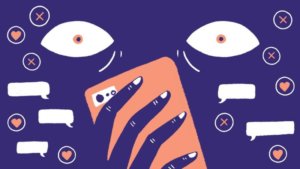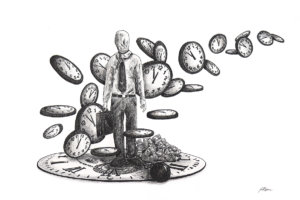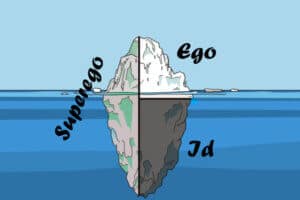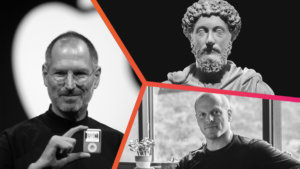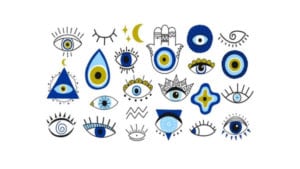
Now let’s imagine having one of these heart-to-heart conversations that we all ideally dream of having with our fathers. With all my fatherly wisdom, I will tell you about the three most important life skills that no one has told you.
First Important Life Skill: stop taking things personally.

An unfortunate side effect of our consciousness living in our brain is that everything we experience in life involves us in some way. You get angry at someone in traffic. The news bulletin you saw last night worries you. Your company’s leap this year will earn you more money.
As a result, we have a bias against assuming that everything that happens to us is really about us. This is something in human nature.
Just because you’re experiencing something, just because one thing makes you feel a certain way, or just because you care about something doesn’t mean it’s about you.
It is difficult to remember this when running through life. This is not just because we are embedded in our brains and our own bodies. It also makes us feel good for a short time. So we continue to do this without realizing it.
So it feels good to think that everything that happens in your life is good for you, because it’s good, it makes you feel great. However, there is a price you pay for that. This price is that the opposite of this situation is also happening. So it makes you think that all the bad things in your life are also about yourself.
When all is well, you feel like a gift from the gods to the earth. When things go wrong, you turn into a smug person who has been wronged and deserves better.
It is this sense of entitlement that is constant. This creates a constant sense of injustice and turns you into an emotional vampire. You become an anti-social black hole that drains the energy and love of those around you.
Okay, maybe a little dramatic. But you know what I mean.
When people criticize or reject you, it probably has more to do with them. At least more than he has to do with you. Other people just don’t think too highly of you (after all, they’re too busy trying to believe it’s all about them).
Failing at something you do doesn’t mean you’ve failed as a person. It just means that you are a person who fails sometimes.
When something tragic happens and you suffer a lot, remember that living is part of choosing to face difficulties, the tragedy of death is something that gives life meaning. Pain has no prejudices, it affects us all. To deserve or not to deserve is not part of the equation.
Second Important Life Skill: How to be convinced and change your mind?

Most people, when their beliefs are challenged, use their beliefs like a life jacket on a sinking ship.
The problem is that one’s faith is often the sinking ship.
Our beliefs not only give us ideas that we are true, they also form essential components of our identity. And questioning these beliefs basically means questioning who we are.
That’s why we choose to plug our ears with our fingers, chanting “La la la la la la” over and over, hoping that the unfortunate evidence that we were wrong will magically disappear.
Take someone who doesn’t believe in climate change, for example. Many of these people are not stupid. They have a good understanding of what science says. They also understand the arguments. The problem is that these people reject climate change not just because they think it’s real. At the same time, rejecting climate change also represents who they are as human beings. But this commitment to our beliefs doesn’t just apply to science and politics. These beliefs also affect most people’s daily lives.
You will be very wrong in life. Because your ability to be successful and learn in the long run is directly proportional to your ability to change what you believe in response to your ignorance and mistakes.
Try this: Write down 20 things in your life today that you could potentially be wrong about. Not just material things.
Our aim here is to question some of these deep assumptions about your identity. For example, I am not an attractive person; I am lazy; I don’t know how to talk to people; I will never be happy because I am stuck somewhere in life…
The more emotional these assumptions are, the more important it is to write down and challenge that assumption. This may sound uncomfortable at first. You will have many assumptions that you do not want to question. But think about it this way: if you’ve never seen the other side before, if you never challenged them, how confident can you be in the limits of your own beliefs? What we want to develop is the ability to see the “other side”.
Third Important Life Skill: How can you act without knowing the outcome?

For most of your life, almost everything has a clear consequence attached to it. You write your term paper at school because that’s what your teacher told you to do. At home, you clean your room because your parents rewarded you for it. When you’re at work, you do what your boss wants because he pays you for it.
There is no uncertainty. It’s like you’re just pretending.
But most of life—that is, real life—does not work with this logic. When you decide to change careers , no one can tell you which career is right for you. No one is saying that when you decide to be with someone, that relationship will make you happy. When you decide to start a job or move to a new country, or have pancakes for breakfast instead of pancakes, you have no way of knowing if what you’re doing is right.
And so we avoid it. We avoid making these decisions. We avoid acting unknowingly. And because we can’t act on what we don’t know, our lives remain incredibly repetitive and overconfident.
I get a lot of emails from people asking how to find their life’s purpose. Or they want to know if they’re in the right relationship, if they’re making the right change. And I don’t answer these people because I have no idea. Because no one can decide what is right for your life.
There’s a wonderful scene in The Dark Knight where the Joker shares his life’s philosophy:
“I just do things.”
(“I am just doing something.”)
For all of the Joker’s flaws (terrorist, murderer, armed robber, assassin – but we’ll ignore those for now), it does make sense here.
The truth is: sometimes we look for loads of reasons to achieve difficult things. But trying to achieve that thing for reasons is wrong. Don’t look for a reason, do it because you can! Do it because they exist. As George Mallory was asked when asked why he wanted to climb Everest, he said: “because it’s there.”
Add some chaos to your life. A certain amount of chaos is healthy. It evokes growth, change, passion and excitement.
This chaos will train you to better make uncertain life decisions. He’ll train you to start something without knowing where the hell you’re going.
Related Content: Find the Chaos Within – Cem Seymen[TED]
While this will lead to thousands of small mistakes, it will likely result in the biggest success of your life.
You can start small. Email someone. Buy an online training. Call a friend or family member and tell them, “Show me something new that you think is surprising.”
But of course there is a subtle pitfall here.
After reading this article, many of you will say: I learned that despite the uncertainty, in order to make these big decisions in my life, I have to start doing something spontaneously. So let’s see, what can I do with myself today and how can I plan these things to do?
You lost.
You lost before you started, you’ve already failed.
But that’s not the point anyway…
There is no progress in this business. There is no such thing as progress. Stop doing everything you do to reach the goal.
Or in other words: be good at wasting time in unexpected ways.

